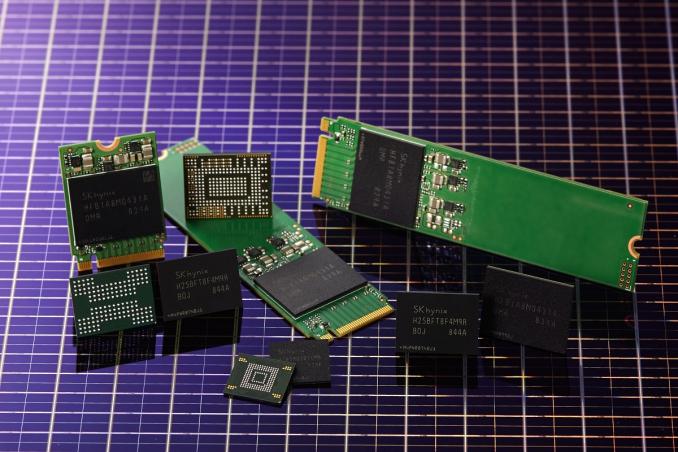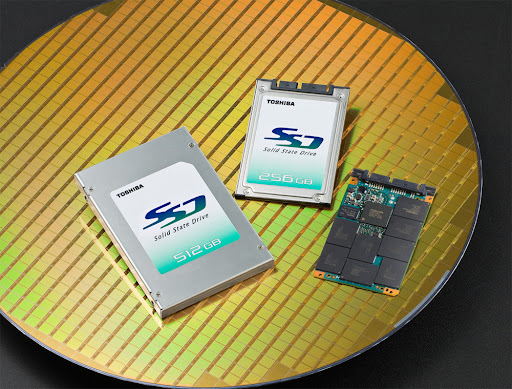128TB SSD: The New Frontier in Enterprise Storage
Introduction
In the era of rapidly rising artificial intelligence, machine learning, and large language models (LLMs), businesses are facing the unprecedented challenges of surging data volumes and the urgent need to swiftly extract valuable insights from data. In this technological revolution, the performance, scalability, and efficiency of storage solutions have become crucial, particularly in covering the entire AI data lifecycle, from data acquisition to model deployment and application.
Industry Leaders' 128TB SSD Strategies
 To tackle these challenges, major storage manufacturers are pushing the boundaries of enterprise SSD capacity to 128TB, catering to data centers' demand for ultra-high-capacity storage. The 128TB SSD, with its ultimate performance, data resilience, new data paradigms, high scalability, green energy efficiency, and data weaving capabilities, plays a vital role in the AI era.
To tackle these challenges, major storage manufacturers are pushing the boundaries of enterprise SSD capacity to 128TB, catering to data centers' demand for ultra-high-capacity storage. The 128TB SSD, with its ultimate performance, data resilience, new data paradigms, high scalability, green energy efficiency, and data weaving capabilities, plays a vital role in the AI era.
● Western Digital announced a 128TB eSSD at FMS 2024, expected to be officially released in 2025, based on the jointly developed eighth-generation BiCS8 NAND flash memory with Kioxia, indicating future storage capacities that may reach 256TB or even 1PB.
● Phison Electronics plans to launch 64TB and 128TB X200 solid-state drives in the coming months, meeting the high storage capacity demands of generative AI.
● SK hynix's financial report for the second quarter of 2024 shows strong demand for HBM and eSSD memory suitable for AI, with sales expected to increase fourfold year-on-year in 2024, and plans to launch a 60TB eSSD product in 2024, followed by a 128TB eSSD in early 2025.
● Huawei's released OceanStor A800 storage product offers four times the bandwidth and eight times the IOPS of similar industry products, supports EB-level capacity expansion, and from a spatial energy consumption perspective, has a density of up to 1PB/U and an energy consumption as low as 0.7Watt/TB.
● Samsung also demonstrated its technical strength, planning to launch 256TB SSDs between 2024 and 2026, 512TB products between 2027 and 2029, with a 1PB SSD expected to be released by 2035.
Role of 128TB SSDs in AI Applications
 The 128TB SSD offers ultimate performance, including PB-level bandwidth and billions of IOPS, meeting the stringent requirements for data processing speed in AI training and inference. Through architectural and technological innovation, the 128TB SSD achieves 99.9999% reliability, with a built-in anti-ransomware engine that reduces checkpoint recovery time in AI training to less than a minute, ensuring data security and business continuity. Moreover, the 128TB SSD supports multi-dimensional "tensor" format data, with rapid tensor data retrieval capabilities, optimizing the way AI models process and analyze multi-dimensional data. High scalability supports horizontal expansion of capacities up to EB levels, adapting to the rapid growth of data volume. The green energy-saving features, through innovative storage media applications and hardware design, achieve storage efficiency of less than 1Watt/TB, reducing the energy consumption of data centers. The data weaving capability of the 128TB SSD, based on storage metadata management and retrieval, enhances the efficiency of data flow and builds the foundation for AI data lake storage, achieving efficient management and mobility of enterprise-wide data assets, providing a solid storage foundation for data-driven decision-making in the AI era.
The 128TB SSD offers ultimate performance, including PB-level bandwidth and billions of IOPS, meeting the stringent requirements for data processing speed in AI training and inference. Through architectural and technological innovation, the 128TB SSD achieves 99.9999% reliability, with a built-in anti-ransomware engine that reduces checkpoint recovery time in AI training to less than a minute, ensuring data security and business continuity. Moreover, the 128TB SSD supports multi-dimensional "tensor" format data, with rapid tensor data retrieval capabilities, optimizing the way AI models process and analyze multi-dimensional data. High scalability supports horizontal expansion of capacities up to EB levels, adapting to the rapid growth of data volume. The green energy-saving features, through innovative storage media applications and hardware design, achieve storage efficiency of less than 1Watt/TB, reducing the energy consumption of data centers. The data weaving capability of the 128TB SSD, based on storage metadata management and retrieval, enhances the efficiency of data flow and builds the foundation for AI data lake storage, achieving efficient management and mobility of enterprise-wide data assets, providing a solid storage foundation for data-driven decision-making in the AI era.
Conclusion
The progress of the 128TB SSD layout by storage industry leaders demonstrates the future trend of storage technology and reflects the new requirements for data storage in the AI era. As technology continues to advance and market demand grows, we look forward to the continuous emergence of higher-capacity, higher-performance storage solutions, further promoting the development and application of AI technology.
Conevo Component
● The MIC5219YMM-TR is an efficient linear voltage regulator (LDO) manufactured by Microchip Technology. The MIC5219YMM-TR features high efficiency and peak output current capabilities, a very low dropout voltage, and an output voltage accuracy of better than 1%. CMOS or TTL compatible on/off control signals are available as well as reverse battery protection, current limiting, overtemperature off and low noise performance, including ultra-low noise options. The MIC5219YMM-TR is ideal for use in applications that require high efficiency and peak current output, especially in portable devices and precision electronics such as: mobile phones and battery-powered devices, consumer and personal electronics, PC card VCC and VPP regulation and switching, rear regulator /DC to DC modules for power management modules, etc.
● The OV10650-E85Y-OD is a high-performance automotive image sensor from OmniVision Technologies with a resolution of 1.7 megapixels, a 2:1 aspect ratio, and a dynamic range of 120 dB. Built-in temperature sensor and disposable programmable (OTP) memory. Image sensor processor with lens correction, bad spot elimination, HDR synthesis and tone mapping, automatic black level correction and other functions. It is especially suitable for applications in the automotive industry that require extremely high image quality, and can provide clear video images under various lighting conditions.
● GD25Q16ENIGR is a NOR Flash memory chip produced by GigaDevice with a storage capacity of 64Mbit and a supply voltage of 3.3V. It is packaged as WSON8 with a size of 6*5mm and is suitable for application scenarios in the industrial temperature range (-40 to +85 degrees Celsius). The GD25Q16ENIGR is widely used in industrial control, Internet of Things devices, automotive electronics, smart home appliances and other fields, especially for applications requiring high reliability and a wide temperature range.
Website: www.conevoelec.com
Email: info@conevoelec.com







